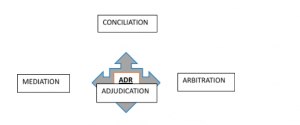This article is written by Ayushi Joshi, pursuing a Certificate Course in Arbitration: Strategy, Procedure and Drafting from LawSikho.com.
Table of Contents
Introduction
This article attempts to elucidate “adjudication” and also the difference between it, and the other sorts of ADR (Alternate Dispute Resolution) procedures. The idea behind the drafting of this text is to portray an outline of the concept of adjudication and other kinds of ADR. Increasing adoption of methods of dispute resolution has made this subject quite essential for lawyers to study and for the general public so as to possess awareness per this subject.
The term “adjudication” per se refers to a process by the virtue of which a dispute in question is resolved by application of law of the land and carried out by a judicial authority, or in a simpler version, it refers to an act of judging a case. It is a process by which a dispute or a matter is resolved using a legal mechanism. The outcome of such a process of adjudication may be legally enforceable. An adjudication also refers to the judgment passed by a judge, which reflects and lists out the further course of action with respect to a given dispute or case. Black’s Law Dictionary defines adjudication as, “the legal process of resolving a dispute”, “the formal giving or pronouncing of a judgment in a court proceeding” and “also the judgment or decision was given.” ADR includes methods by which an alternative approach is adopted in resolving the dispute between parties without taking recourse to the formal court of justice, i.e. litigation. 
ADR as an alternative to the traditional process of adjudicating a dispute
As the name suggests, ADR is an alternative to the traditional process of adjudication or dispute resolution as by approaching the courts. ADR methods and techniques result in the amicable settlement of disputes, which is generally not possible through the medium of courts. Many of such practices have evolved to settle the disputes ensuring minimum adverse impact on the relationship of the parties. Alternative Dispute Resolution provides for a confidential and alternative method of tackling and resolving disputes and thus avoiding the possibility of getting involved in litigation. ADR processes provide procedural flexibility, save valuable time, money and avoid the stress of a conventional trial. The International Centre for Alternative Dispute Resolution (ICADR) is a unique centre that makes provision for promoting, teaching, and research in the field of ADR, it also facilitates ADR services to parties all over the world. It maintains panels of independent experts in the implementation of ADR processes. Almost all disputes including commercial, civil, labour, and family disputes, in respect of which parties are entitled to conclude a settlement, can be resolved by an ADR procedure. ADR techniques have been proven to work in the business environment, especially in respect of disputes involving joint ventures, construction projects, partnership differences, intellectual property, personal injury, product liability, professional liability, real estate, securities, contract interpretation, and performance and insurance-related disputes.
The below-given diagram reflects an overview of the scheme of the article:

The Alternate Dispute Resolution majorly includes arbitration, conciliation, mediation, and negotiation. Considering the Indian scenario, the Lok Adalat is another additional form of ADR mechanism. It functions by combining different techniques like conciliation, mediation, and negotiation.
Lok Adalat is a unique system developed in India, which literally translates to people’s (public) court. It is essentially a forum wherein a voluntary effort to conceive a settlement of disputes is made between the parties through amicable, conciliatory, and persuasive means. It envelopes in itself negotiation, mediation, and conciliation together, as tools to resolve disputes between the parties. The Code Civil Procedure 1908 of India, is the statute from which Lok Adalats draw their powers.
Arbitration : issuing the settlement through the intervention of a third party
Arbitration is a process of ADR wherein parties to a dispute issues the settlement through the intervention of a third party (or parties), in order to resolve the matter without seeking litigation or involvement of a court. The settlement of the dispute is carried out by the third party (or parties). Such a third party resolving the dispute is called an “arbitrator.” The parties agree mutually to abide by the judgment or decision of such arbitrator and place their confidence in him. Arbitration in India is governed by the Arbitration and Conciliation Act 1996, amended in 2021 by receiving presidential assent. Arbitration method can prove to be a particular advantage in the disputes wherein there is the requirement of an understanding of technical knowledge and where privacy is important or if there is an international jurisdiction or law applicable with respect to the matter in question. The decisions which are the outcome of arbitration are binding in nature, provided as given in, the Arbitration and Conciliation Act, 1996 by way of an explanation to Section 34(2)(b)(ii), provides that an award may be set aside if the court finds that the arriving process of an arbitral award has been induced, inspired or laced by fraud which makes it ultra vires to the public policy of India. The majority of contracts nowadays, mention an arbitration clause, which directs arbitration as a dispute resolution method to be used in case of any dispute arising between the parties to the contract. Such clauses also include express mention of place of arbitration and appointment of an arbitrator as well. Such clauses are not statutorily mandated to be included in a contract, even if such mention is absent, parties may still adopt arbitration as the method of dispute resolution by mutual consent.
In order to consolidate and amend the law relating to domestic arbitration, international commercial arbitration, enforcement of foreign arbitral awards, and also provide for a law relating to conciliation and related matters, the Arbitration and Conciliation Act, 1996 had been passed. This Act was based on the United Nations Commission on International Trade Law (UNCITRAL), model law on International Commercial Arbitration. Important terms defined in the above-mentioned Act are given below:
- Arbitration under Section (2)(1)(a) – It refers to any arbitration whether or not administered by a permanent arbitral institution.
- Arbitral Award under Section (2)(1)(c) – It includes an interim award.
- Arbitral Tribunal under Section (2)(1)(d) – This means a sole arbitrator or a panel of arbitrators.
- Party under Section (2)(1)(h) – It means a party to an arbitration agreement.
- Arbitration Agreement under Section 7 – Means an agreement referred to in Section 7, and has been defined to mean an agreement by the parties to submit to arbitration all or certain disputes which have arisen or which may arise between them in respect of a defined legal relationship, whether contractual or not.
Process of arbitration
The parties to the dispute, submit the dispute to arbitration by an agreement. They can submit either the present or future dispute to arbitration, by an arbitration agreement. Such a dispute must arise out of a defined legal relationship, whether it is contractual or not. According to the Hon’ble Supreme Court of India, arbitration is the judgment of a dispute between two parties by a third party who is not in any manner involved in the dispute. In arbitration, the parties to the dispute are free to appoint the person or persons who shall act as an arbitrator as per their will. Parties can, either appoint individuals or any institution, as an arbitrator, they arbitrate and solve the dispute between the parties. Whereas, if an institution is appointed as an arbitrator, then it acts as an administrator, and manages the affairs of the process. Arbitration can be, either consensual or statutory. If it is in pursuance of an arbitration agreement, then it is known as consensual arbitration, but if submission of a dispute to arbitration is due to the provisions of any particular statute then it is a statutory arbitration.
Types of arbitration
- Ad-hoc arbitration
- Contractual or consensual arbitration
- Institutional arbitration
- Statutory arbitration
Case laws
1. Mohri Bibi vs. Dharmodas Ghosh
It was stated in this case that an agreement with minors is void. In reference to this case, the provisions of the Indian Contract Act 1872 and Arbitration and Conciliation Act 1996 in relation to a minor and arbitration had been referred to. Since a minor is not competent to contract, the arbitration agreement can be made on behalf of the minor. Such arbitration agreement can be made by a natural guardian or legal guardian of the minor on his/her behalf. The arbitration agreement must be made in good faith and for the benefit of the minor or for protecting the property of the minor. The award passed in relation to such arbitration agreement shall not be binding on minors if, a minor was not properly represented and his/her guardian fails in his duty to protect his interests. If a minor is a party to suit, his guardian-ad-litem can make a reference to arbitration.
2. K.K. Modi vs. K.N. Modi
It was held in this case that, the intention of the parties to opt for arbitration, must be expressed, in clear, precise, and unambiguous terms. The words of the arbitration agreement must clearly express and display the intention of the parties. If any agreement containing an arbitration clause or a separate arbitration agreement is made with the government, then it should conform to the provisions laid down in Article 299 of the Constitution of India.
3. ADM International Sarl v. Sunraja Oil Industries Pvt. Ltd. And others
The Madras High Court discussed the principal conditions for granting an anti-arbitration injunction in the above-named case. The Madras High Court reiterated the findings of the Delhi High Court in the case of McDonald’s India Pvt. Ltd. v. Vikram Bakshi and Others, wherein it was held that the court would be in a position to grant an anti-arbitration injunction only in the circumstances when the arbitration agreement is:
(i) null and void,
(ii) inoperative, or
(iii) is incapable of being performed.
Conciliation : requirement of a conciliator to act as the third party
Conciliation is a method of ADR with the nature of being an informal process wherein, the conciliator being the third party attempts to bring the disputants to an agreement. He does this by using several methods like, minimizing tensions, facilitating communications, clarifying issues, mulling potential resolutions, and thus attempting to facilitate a mutually agreeable outcome solution. Part III of the Arbitration and Conciliation Act 1996 applies to conciliation of disputes arising out of the legal relationship, whether contractual or not, and to all proceedings relating thereto. Section 62 of the Act provides that the party attempting to initiate conciliation shall send to such other party, an invitation in written format to engage in conciliation, including brief identification of the subject matter of the dispute. Commencement of conciliation proceedings initiates when the other party accepts in writing, the invitation to engage in such conciliation proceeding. It is also stated that in case wherein the other party rejects the invitation to conciliation proceedings, then there shall be no proceedings conducted. If the party sending the invitation does not receive a reply from the opposite party within 30 days or within the time period as specified in the invitation, then, in that case, the sender may elect to assume it as a rejection of the invitation and shall inform the opposite party in writing of such consideration of rejection. In a conciliation proceeding, one conciliator is to be appointed unless the parties agree that there shall be an appointment of two or three conciliators as per their intent. In case of the appointment of more than one conciliator, they are supposed to act jointly to settle the dispute. The conciliator is not bound by the provisions of the Civil Procedure Code 1872. The conciliator is expected to give assistance to the parties to reach the settlement and during such function of acting as a conciliator, he is supposed to be impartial and independent in his conduct.
Appointment of the conciliator
The appointment is provided under Section 64 of the Act.
- In case wherein one conciliator is appointed, the parties may agree mutually on the name of such a sole conciliator to be appointed. Such appointments shall be mutually agreed upon.
- In cases wherein two conciliators are appointed, each party is allowed to appoint one conciliator each.
- In which three conciliators are appointed, each party is allowed to appoint one conciliator each. The parties may mutually decide with respect to the appointment of third conciliator, who shall be acting as the presiding conciliator.
Haresh Dayaram Thakur vs. State of Maharashtra
It was held in this case, by the Supreme Court of India that a successful conciliation comes to an end only when the settlement agreement signed by the parties comes into existence. It is such an agreement that has the status and effect of legal sanctity of an arbitral award under Section 74 of Arbitration and Conciliation Act 1996.
Mediation
The term “mediation” refers to a process wherein a third party attempts and assists the others to be able to reach an agreement regarding their dispute. The activity of mediation originated in ancient times. The practice was developed in ancient Greece than in the Roman civilization. Mediation is a voluntary process of ADR, wherein the outcome is a signed agreement. The mediator is not empowered to render a decision, he facilitates the resolution process while using different skills, to enable the parties to reach an amicable settlement. In a mediation procedure, a neutral intermediary person or entity, known as the mediator, helps the parties to reach a mutually agreeable and satisfactory settlement of their dispute. Any settlement, as an outcome, is recorded in an enforceable contract. A mediator is not authorised to give out a judgment but acts as a mere facilitator, who is neutral. The outcome of the mediation is not binding on any party which does not accept such a decision. The parties opting for the mediation process have the opportunity to describe the issues, discuss their interests amicably, understand, provide each other with information, communicate and explore ideas for the resolution of the dispute. Courts have the power and discretion to mandate that particular cases adopt mediation, but essentially the process is “voluntary” in nature, that the parties are not required to come to an agreement. The mediator does not have the power to make a decision for the parties but can help the parties find a resolution that is mutually acceptable. The only people who can resolve the dispute in mediation are the parties themselves. There are a number of different ways that mediation can proceed. Mediation essentially is a process that ensures the interests of the parties and efforts of the mediator are directed towards ensuring the intentions, rights, and best interests of the parties.
6 steps to a formal mediation
1) Introductory/opening remarks
2) Statement of the subject matter of the issue by the parties
3) Period of relevant information collection
4) Identification of the issues
5) Bargaining, communication via dialogs and generating possible solutions
6) Reaching a mutually agreeable agreement.
Case laws
- Afcons Infrastructure Limited v/s Cherian Varkey Construction Company Private Limited: It was held by the Supreme Court of India in this case that all cases relating to trade, commerce, contracts, consumer disputes, and tortious liability could normally be mediated.
- M. R. Krishna Murthi v. New India Assurance Company Limited: The Supreme Court of India asked the Government to consider the feasibility of enacting a statute relating to mediation, to provide and regulate various aspects of mediation.
Adjudication : a neutral third party giving the decision
- Adjudication involves an independent third party, known as the adjudicator, he considers the submissions and disputes of both sides and arrives at a final outcome, that is a decision. The adjudicator has expertise in relation to the subject matter of the dispute. Adjudicators’ decisions are usually of a temporarily binding nature, i.e. they are binding on the parties unless and until challenged and repealed in subsequent litigation through court or via the process of arbitration. There are very few such instances of cases where the matter is subsequently taken up for litigation or arbitration post-adjudication, in practicality.
- There are particular circumstances wherein the party has a statutory right to adjudicate (the UK Housing Grants, Construction and Regeneration Act 1996), accordingly either parties in a construction contract possess a right to adopt adjudication at any time. In the case of statutory adjudication provisions providing that the adjudicator has a limit of 28 days from his appointment to deliver a decision, the same decision could be then enforced via summary judgment through the courts.
- In the UK, Macob Civil Engineering v. Morris Construction Limited was the first case wherein the adjudicator’s decision was enforced. Countries like Singapore, New Zealand, Malaysia, and some particular States of Australia have adopted adjudication and have enacted legislation to apply to the same.
- Adjudication may be defined as a process where a neutral third party gives a decision, which is binding on the parties in dispute unless or until revised in arbitration or litigation. This narrow interpretation may refer to the commercial use of an adjudicator to decide issues between parties to the use of an adjudicator is found in a variety of standard forms of contract used in the construction industry. Until recently, adjudication in the construction industry has displayed certain characteristics. An adjudicator is a neutral individual who is not involved in the day-to-day running of the contract. He or she is neither an arbitrator nor a State appointed judge.
- Second, the adjudicator enjoys his or her powers by virtue of the agreement between the parties. In other words, the parties have agreed by contract that the decision of the adjudicator shall decide the matter for them. Third, the adjudicator’s decision is binding on the parties, and therefore, unlike mediation, the process does not require the cooperation of both parties. Fourth, adjudicators’ decisions are usually expressed as being binding until the end of the contract when either party may seek a review of the decision, most commonly by arbitration. Finally, adjudication is not arbitration and is therefore not subject to the Arbitration Act 1996. It follows therefore that an adjudicator’s powers are limited to those which are contained in the contract.
John Doyle Construction Limited (in liquidation) v. Erith Contractors Limited
Mr. Justice Fraser in this case set out the principles to be applied while considering an application for summary judgment on an adjudication decision in favour of a company in liquidation. The case is significant since it highlights the issues which are to be considered by the insolvent companies at the time of seeking to enforce adjudication decisions.
Comparative analysis involving methods of ADR
|
Basis |
Arbitration |
Conciliation |
Mediation |
Adjudication |
|
Authority |
Arbitrator acting as adjudicator |
Conciliator acting as evaluator |
Mediator acting as facilitator |
Adjudicator acting as independent third party facilitator |
|
Outcome of proceeding |
Legally binding |
Not legally binding |
Not legally binding |
Legally binding until if the matter is submitted to arbitration, conciliation or judicial proceeding |
|
Confidentiality |
As determined by law |
As determined by law |
Based on mutual trust and commitment |
Based on mutual trust and commitment |
|
Nature of proceeding |
Formal |
Semi-formal |
Informal |
Semi-formal |
|
Basis of decision |
Evidence, submissions of parties to a dispute, witness, and law |
Submission of parties |
Depends on mutual understanding of parties |
Terms of contract, evidence, and law. |
|
Powers of the authority |
As per law |
As per law |
No powers as such |
As per the contract and law if applicable |
|
Agreement |
Prior agreement required |
Not required |
Not required |
Mention in the contract |
Conclusion
Adjudication is a mix of all the qualities of ADR methods. It has adopted qualities that give more options to the parties to be able to customise their dispute resolution options. It is not a conventional method that is the same size fits for all, but it gives the opportunity to the parties to make a different version for themselves which suits their needs. It is not yet quite common in India, but the origin of this method of ADR can be traced to the UK. It is a hybrid mix of mainly arbitration and conciliation along with hints of negotiation. This method is bound by the contract or agreement to which it owes its existence. The process taken up by the adjudicator is also pre-mentioned in such agreements or contracts. It is similar to an arbitration clause in an agreement or contract. In certain instances, there is also a statutory right to adopt adjudication under the legislation in force in the UK.
Students of LawSikho courses regularly produce writing assignments and work on practical exercises as a part of their coursework and develop themselves in real-life practical skills.
LawSikho has created a telegram group for exchanging legal knowledge, referrals, and various opportunities. You can click on this link and join:
 Serato DJ Crack 2025Serato DJ PRO Crack
Serato DJ Crack 2025Serato DJ PRO Crack










 Allow notifications
Allow notifications


